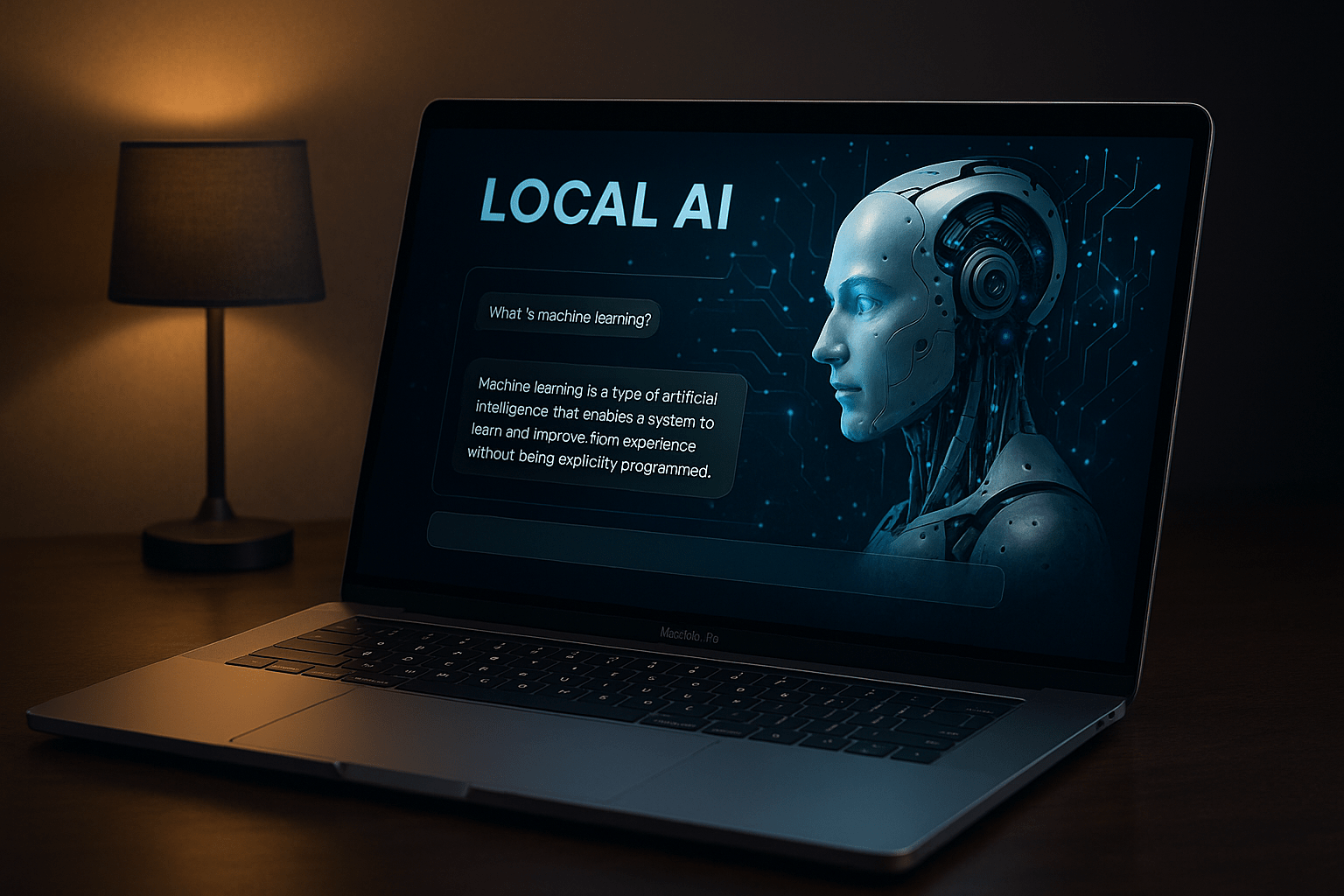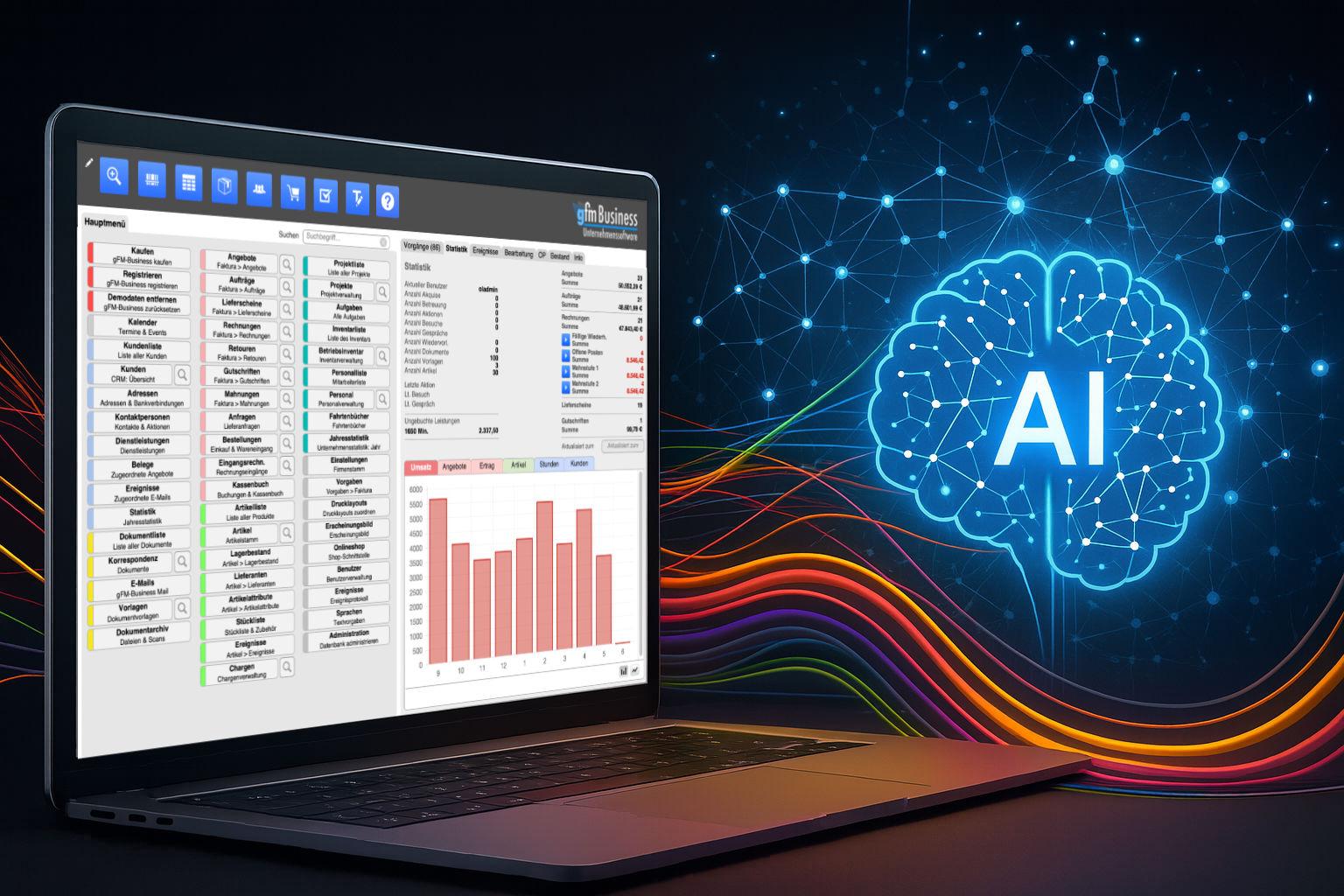Just a few years ago, artificial intelligence was a topic for research institutes and large corporations. People talked about neural networks, deep learning and speech recognition - but it hardly played a role in everyday life. Today, AI is no longer a topic for the future, but a reality: it writes texts, creates images, analyzes data and controls production processes. Whether in administration, trade or industry - it can now be found everywhere.
This has also changed the job market. Companies that used to look for computer scientists or programmers are now specifically looking for people who can work with AI. Not necessarily as researchers, but as practical users who understand how AI can be meaningfully integrated into operational processes. A new field of expertise is emerging - and with it a need that can no longer be ignored. I have already presented this in another article, which professions will be replaced by artificial intelligence could become.
Cloud AI: the fast but expensive option
The majority of today's AI systems are based on cloud solutions. Providers such as OpenAI, Google or Anthropic provide enormous computing power that a single company could never build up. This makes cloud AIs attractive: they deliver results immediately without the need to operate your own servers.
But this convenience comes at a price - in the truest sense of the word. Using such systems costs per request or per token, and anyone who regularly works with AI quickly realizes that the bills are rising. There are also data protection and dependency issues: sensitive company data migrates to external data centers, often outside Europe. This is a dilemma for many companies, especially SMEs. They want to benefit from the advantages, but do not want to relinquish control. This is precisely where a new space opens up for specialists who understand how to set up and operate their own local AI systems.
Local AI: Europe's silent countermovement
While the US dominates the cloud market, a quiet but significant counter-movement is growing in Europe: local, self-hosted AI systems. Modern computers - often with Apple or NVIDIA hardware - can now run models that were unthinkable just two years ago. The advantages are obvious:
- Data sovereigntyEverything stays in-house, no data is sent outside.
- Calculable costsOne-off hardware investment instead of constant token fees.
- CustomizabilityModels can be trained on your own data, such as company documents or knowledge databases.
This development is particularly crucial in Germany, where data protection, efficiency and sustainability are traditionally highly valued. Local AI is no longer a toy for tinkerers, but a serious tool for companies, authorities and educational institutions.
Why companies need their own AI specialists
Many companies have now recognized that AI systems cannot simply be 1TP12ed and forgotten like software. They need to be understood, maintained and further developed. An in-house AI specialist can:
- automate internal processes with AI,
- set up and maintain local systems,
- Implement data protection concepts,
- and serve as a point of contact between management, IT and specialist departments.
This is not just about technology, but about understanding - for data, connections, limits and opportunities. People who have mastered both are particularly valuable: Database logic and AI integration. Because without a clean database, every AI remains blind.
A new specialist area is created
The market is reacting slowly, but noticeably. Universities, vocational schools and chambers of industry and commerce are beginning to develop corresponding courses. At the same time, many entrepreneurs see the need for action - they already want to support trainees or employees in this direction. There is still no official IHK profession "AI specialist". But the foundations have been laid: new additional qualifications, certificate courses and modernized IT training. Those who start to follow such paths today will give themselves a clear head start.
Between reality and expectation
If you want to train someone to become an "AI specialist" in Germany today, you quickly realize that there is no recognized training occupation that carries this title. You will search in vain for terms such as "artificial intelligence", "machine learning" or "prompt engineering" in the official IHK professional register.
This is not because the chambers are asleep. Rather, it is because the dual training system works very slowly and thoroughly. New job profiles are only introduced when technologies and market requirements stabilize over the years. AI, on the other hand, is developing at a monthly pace - far too fast for the rigid corset of traditional training regulations. The result: companies have a need, but no official grid into which they can fit their training. And yet things are moving.
The IHK responds - with additional qualifications and pilot projects
Instead of immediately creating new professions, people have started to add AI modules to existing training courses. Many chambers of industry and commerce now offer so-called additional qualifications or certificate courses that can be completed alongside or after training. Examples of these are
- "Artificial intelligence and machine learning" (ZQ KI) - an additional qualification that is currently being piloted in several federal states.
- "AI Scout (IHK)" - a program that enables trainees to identify AI potential in their company and initiate initial projects.
- "AI Manager (IHK)" - further training for specialists and managers to develop AI strategies in the company.
- "Certified Professional Specialist for Artificial Intelligence and Machine Learning (IHK)" - a relatively new, practice-oriented course that combines an understanding of AI with project work.
These formats are not yet training occupations, but they are the first building blocks of a new skills profile that will probably develop into a separate job profile in the coming years. Those who start today will later be among the experienced employees who shape such new profiles.
AI as an economic driver for SMEs? | Prof. Dumitrescu (Source: Fraunhofer)
Why the existing apprenticeships are now the bridge
As long as there is no "AI specialist" as a job title, the only option is to develop existing digital training occupations specifically in the direction of AI. This means using the existing vocational school structure, but supplementing it with practical AI projects in the company. This is not a stopgap measure - on the contrary: many of the established IT professions already contain content that lays the foundation for AI work.
Below is an overview of the most suitable professions:
- IT specialist for data and process analysisThis profession was newly created in 2020 and is currently the most modern IT training profession. The focus is on evaluating, structuring and using data - exactly what every AI needs. Apprentices learn to understand data flows, model databases and optimize processes with the help of software. With an additional qualification or a little initiative, this can quickly become a solid AI foundation. For example, anyone who accompanies small machine learning projects in their training company or writes Python scripts for data analysis is practically already working as a "junior AI specialist", even if this does not appear on their certificate.
- IT specialist for application developmentThe classic software developer is also close by. Here, the focus is on the development and integration of applications, and this is precisely what is crucial in the AI context. Because someone has to bridge the gap between the models and the operational reality: data has to be imported, prompts generated, results saved and workflows automated. Companies that use ChatGPT or local LLM interfaces (e.g. Ollama, Mistral or LM Studio) into their processes will benefit enormously if an apprentice or employee learns this profession and familiarizes themselves with Python, REST APIs and AI frameworks at the same time.
- Businessman/woman for digitization managementThis profession is less technical and more strategic and organizational. It is ideal if a company not only wants to use AI, but also wants to prepare processes and data structures for it. The trainee learns to plan digitalization projects, evaluate costs and manage IT projects. If this is supplemented by AI basics - for example through online courses or IHK courses - the result is an in-house project manager for the introduction of AI who can mediate between technology and management.
- IT systems electronics technicianThe focus here is more on hardware, networks and system integration. However, this profession is also evolving, as many modern systems are now supported by AI - from cameras and sensors to edge computing solutions. System electronics engineers who understand how to combine such devices with local AI models, for example for quality control or fault detection, will quickly become irreplaceable.
- Digital and print media designer, specializing in digital mediaA less obvious but increasingly interesting area. With the spread of generative AI in design, advertising and content production, new roles are emerging in which creative professionals are learning to use AI tools in a targeted way to speed up processes and improve quality. Smaller agencies in particular can introduce trainees to topics such as "AI-supported image processing", "text-to-image" or "automated layouts" at an early stage.
- Dual study program or mixed formsDual study programs such as "Applied Computer Science", "Data Science" or "Business Informatics" are now also being strongly supplemented with AI content. They are particularly suitable for companies that want to implement more complex projects, for example in the area of local AI servers, model training or data analysis. The combination of business practice and scientific depth is particularly valuable here - provided that the student is allowed to work on real AI use cases in the company.
The practical side: How companies shape the path themselves
For entrepreneurs, the situation today is paradoxical: there is no clear job title, but countless opportunities to build something. Those who are not put off by the lack of forms can create an individual training path to become an AI specialist in their own company - within the framework of an existing profession, supplemented by practical projects. This can mean
- to employ an IT specialist for local AI development,
- introduce a digitalization trainee in AI project management,
- or have a media designer experiment with generative tools.
The decisive factor is not the title, but the development of real skills - and this is best achieved in practice.
A critical look: From certificate to real qualification
Despite all the enthusiasm, one thing should not be forgotten: Many AI courses have big names, but often only impart superficial knowledge. A two-week online course is no substitute for a solid technical foundation. It is therefore wiser to provide trainees with in-depth training in data processing, logic and process thinking - this is the root of any meaningful AI application. In other words: if you understand the data, you don't need to be afraid of AI. Those who don't understand it will be at its mercy.
Additional qualifications - The unofficial path to becoming an AI specialist
Germany has a tried and tested training system - solid, thorough, legally compliant. But it is precisely this thoroughness that is also its disadvantage when technologies change in a matter of weeks. This is why new learning paths are often created outside the official vocational system. Private academies, IHK training centers and universities now offer a wide range of additional qualifications that close precisely this gap. They are not a substitute for training, but a bridge to the future.
Additional courses: Initial orientation in the AI jungle
In addition to the CCI sector, a market of private providers is growing, some of which are very practical, others more superficial. Platforms such as Coursera, Udemy or OpenHPI now offer solid basic courses in Python, machine learning and generative AI - often free of charge or for little money. Large tech companies such as Google, Microsoft and IBM have also created their own AI certificates that are internationally recognized.
These courses are no substitute for on-the-job experience, but they are a valuable addition. A trainee who completes a private course on neural networks and then implements a small analysis project in the company learns more in three weeks than some students learn in an entire semester.
Schools and universities are slowly following suit
Some vocational schools and universities of applied sciences have recognized that teaching needs to be adapted. The first pilot projects are integrating AI basics into computer science or digitalization subjects. Particularly exciting are collaborations between schools and companies in which students or trainees are allowed to accompany real AI projects - such as process optimization or data analysis.
Here too, entrepreneurs who actively seek discussions with the school have an influence on which topics are covered there. In this way, lessons can be shifted step by step towards practical application.
Self-learning becomes a mandatory skill
Unlike traditional apprenticeships, there is no fixed learning structure in the AI environment. Models, tools and methods change too quickly.
This is why self-learning has long since become part of professional qualifications. Today, a young person who shows that they are able to familiarize themselves with new tools independently is worth more than someone with a formal final grade. It is precisely this attitude - the willingness to explore new things - that should count more in the selection and promotion of trainees today than pure school grades or theoretical knowledge.
Current survey on artificial intelligence
For entrepreneurs - How to specifically promote your own AI trainees
Many entrepreneurs instinctively sense that the next few years will be a time of upheaval. AI will not just be a tool, but a new layer on top of all business processes. Anyone who waits until there is an official "AI profession" will lose valuable time. But if you start systematically introducing your people to these topics today, you will build up expertise that others will have to buy in five years' time at great expense.
- Own projects instead of dry theoryAI knowledge grows through practice. The easiest way to support a trainee or employee is to define a small internal project that brings measurable benefits. For example: automatic text creation for product descriptions, evaluation of customer inquiries with ChatGPT or Ollama connection, AI-supported analysis of stock levels or sales figures, image AI for marketing or design, building a local model that understands company documents. It is important that the project is real - i.e. that it is used in everyday life. This is the only way for the trainee to understand that AI is not an end in itself, but a practical aid.
- Cooperation with the IHK or vocational schoolMany IHK districts are now actively supporting companies in the integration of AI content into training. Entrepreneurs can register their trainees for additional qualifications or take part in pilot projects themselves as practice partners. Vocational schools, in turn, are often open to suggestions when companies offer specific topics - e.g. a teaching unit on the subject of "AI in your own company". This creates a genuine theory-practice cycle that benefits both sides: The company gets motivated junior staff, and the school can teach up-to-date content.
- Understanding learning time as an investmentA common mistake: companies expect immediate productivity. But those who seriously familiarize themselves with AI systems need time to experiment, fail and understand. This learning time is not lost working time, but an investment in future efficiency. A trainee who spends six months developing small AI automations can later optimize processes that save the company many hours every year. In the long term, this pays off several times over - financially and organizationally.
- Creating an open learning cultureAI requires curiosity and critical thinking. If employees are afraid of making mistakes, no one will try anything out. That's why entrepreneurs should specifically promote an open learning culture - with regular workshops, exchange formats and an atmosphere in which questions are allowed. One simple way to do this is to reserve half an hour once a month for trainees or employees to show what new things they have tried out with AI. This motivates and anchors knowledge in the team.
- Use funding programs and subsidiesThe state is now funding numerous digitization and training programs that also include AI projects, for example: "go-digital" of the BMWK - promotes consulting and pilot projects on digitalization, including those related to AI. The program "SME Digital Center" - supports SMEs in the implementation of AI applications. ESF funding for further training and qualification of employees. Entrepreneurs who access these programs early on can significantly reduce their training costs and at the same time build up future-proof skills in-house.
- Choosing the right peopleAI projects do not need programmers in the traditional sense, but rather curious lateral thinkers - people who want to combine, understand and improve. When selecting new trainees, it is worth paying attention to the following characteristics:
analytical thinking, interest in data and structures, self-motivation to learn new things and the ability to pass on knowledge in an understandable way.
Technical skills can be learned - attitude cannot. Those who foster this attitude at an early age are shaping the very skilled workers who will be in short supply everywhere in a few years' time.
From trainee to internal AI officer
With a little foresight, an interested trainee can become an internal AI officer in two to three years - someone who evaluates new tools, sets up interfaces and explains to employees how to use AI sensibly. This is not a distant vision, but is already a reality in many medium-sized companies. It always starts with the first small project, the courage to experiment - and an entrepreneur who makes the time available.
Training AI specialists means creating structures that enable learning
Building AI expertise in a company doesn't start with software - it starts with a clear structure:
- Who takes responsibility?
- Which processes can trainees and specialists design?
- Where is there room for experimentation?
As Systemic management consultant I help companies to clarify precisely such questions - regardless of industry and toolset. After all, real AI expertise is created where employees are not just following orders, but are allowed to think for themselves.
For career starters - How to lay the foundation for your AI future
Many young people today are faced with the question: "Should I wait until there is an official AI profession?" The answer is no. Because by the time this profession exists, the technology will have long since moved on. Those who train themselves today will later be where others are just starting out.
AI is not a closed specialist field like electrical engineering or business administration - it is a toolbox that is constantly expanding. Anyone who learns how to use these tools will never be unemployed.
Personal initiative beats curriculum
In a world that is changing faster than any textbook, self-learning has become the most important skill.
Free learning platforms such as Coursera, Kaggle, Google AI, OpenAI Learn or Fast.ai offer solid basic courses in data analysis, Python and machine learning. Just a few hours a week are enough to implement your first projects - for example:
- a small app that sorts texts automatically,
- a script that summarizes inputs,
- or a local language model that searches documents.
Such small experiments may seem inconspicuous, but they are the best way to establish a real routine.
Document what you learn
Another important point: knowledge that is not documented remains fleeting. That's why it's worth writing down your own learning steps or sharing them publicly - for example in a blog, on LinkedIn or GitHub. This shows potential employers or trainers that you are not just consuming, but understanding, trying out and improving.
Young people in particular who start to build up their own small collection of knowledge at an early age develop a feel for systems - and thus become valuable employees long before they have a certificate in their hand.
Soft skills remain crucial
Despite all the technology, we must not forget: AI is a tool, not a substitute for understanding. Those who can communicate, explain contexts and take responsibility will remain irreplaceable. An AI specialist who thinks calmly, writes clearly and takes responsibility will always stand out from the crowd.
Particularly in Europe, where values such as reliability, data protection and quality count, it is precisely these characteristics that form the basis of any genuine AI expertise.
AI on the labor market: This is what the future could look like (Source: WDR)
Future outlook - when AI becomes the standard
AI is not becoming a profession, but a part of every profession. The current situation is reminiscent of the time when computers came into offices. Back then, "computer literacy" was a special feature - today it is taken for granted. It will be similar with AI: In a few years, we will no longer be talking about "AI specialists", but about specialists with AI expertise.
Whether in trade, in the office or in production - AI will be running in the background everywhere, controlling processes and preparing decisions. That's why every company needs people who know how these systems think, where their limits lie and how to use them in the interests of the company.
New job profiles are emerging - but more slowly than reality
It is foreseeable that the IHK will create new profiles in the coming years - such as "data and AI manager", "IT specialist for AI systems" or "AI technologist". But by then, companies will have long since gone their own way. As is so often the case, practice will run ahead of legislation. This is not a disadvantage. It means that pioneers are gaining experience today and will later be among those who help shape new standards. In a way, we are witnessing the birth of a completely new professional field that does not yet have a name - but already exists.
While the big cloud companies are setting the pace in the USA, a counter-movement is growing in Europe: decentralized, local AI systems that focus on data protection, personal responsibility and stability. This development is not being driven by start-ups, but increasingly by medium-sized companies that think long-term.
This is where the great opportunity lies: with its tradition of quality and responsibility, Europe could form the antithesis to the pure data economy.
And this requires people who understand both technology and attitude.
AI expertise does not grow by title, but by doing
History is repeating itself in a different form: just as the printing press or electrification once gave rise to new professions, AI is also creating a new kind of craft - the craft of digital thinking. But this craft cannot be learned on school desks alone. It grows through practice, curiosity and the will to take on responsibility.
An "AI specialist" is essentially not a technician, but a translator between man and machine. They understand how data works, how systems learn and how they can be integrated into existing processes without losing humanity.
What entrepreneurs should do now
Companies should start laying the foundations now - not by waiting for new training regulations, but by defining their own AI projects, training employees and supporting trainees. Even a small start - such as an internal chatbot, data analysis or local automation - can be the basis for sustainable in-house knowledge.
The smart entrepreneur thinks in terms of skills, not tools.
Because empowering people to understand the technology keeps them independent - from providers, licenses and short-term fads.
What young people should do
If you are young, you shouldn't wait for someone to show you the way. The tools are there, the knowledge is freely available, and those who are willing to learn can already do more today than most people realize. The crucial thing is to get started - step by step, without fear of making mistakes.
Because every little experiment with AI, every script you write yourself or every successful project is a building block for your own future.
Book tip: Process thinking instead of programming stress

Anyone looking for an introduction to the world of databases is quickly overwhelmed by technical terms, syntax and theory. This is exactly where "The Unconventional Database Book" a work that conveys database thinking not as a technical hurdle, but as a logical way of thinking. It provides a step-by-step introduction to the world of structured information without assuming any knowledge of programming. The reader learns how data processes really work, how to model them cleanly and why good data structures form the backbone of every modern application - whether in FileMaker, SQL or another system.
The book starts with what many IT beginners overlook: process thinking. Instead of dryly explaining tables, fields and keys, it shows how to observe and analyze real processes and then transfer them into data logic. Only when this step is understood does the technical side of things make sense - and then become understandable. Later, the book gently introduces SQL and relational concepts, explains relationships between tables, primary and foreign keys and shows in a practical way how to not only store data, but understand it. Further chapters introduce you to working with AI to understand and model databases.
The result is not another textbook on code, but an invitation to think in a structured way. An ideal introductory work for entrepreneurs, trainees and anyone who not only wants to map processes, but really wants to understand them.
A look ahead
In ten years' time, people will look back on this period and say: "That was the phase in which technology became a trade again." Those who are starting out today - entrepreneurs and apprentices alike - will then be the skilled workers that everyone else depends on.
And that is precisely the quiet but decisive message of this time:
AI does not replace people - it makes those who understand how it works valuable.
Frequently asked questions for entrepreneurs
- Is there already an official IHK training occupation "AI specialist" that I can simply advertise?
Currently no. The dual system deliberately works slowly and thoroughly; new professional regulations only come when technologies have stabilized over the years. The practicable path today is to specifically expand existing IT and digital professions in the company to include AI practice, use additional IHK qualifications in parallel and set up real AI projects. Anyone who does this is in fact already training "AI specialists" - even without the title. - Is it better for SMEs to rely on cloud AI or build local systems?
Both have their place, but the balance depends on your data, processes and risk posture. Cloud AI is immediately powerful and reduces technical effort, but incurs ongoing costs and outsources sensitive data. Local AI initially requires more set-up work, but provides data sovereignty, calculable costs and adaptability. In practice, a hybrid approach proves its worth: confidential data locally, non-critical data in the cloud - and internal expertise that can assess when which tool makes sense. - Which existing training professions are suitable for moving towards AI if the official profession does not yet exist?
IT specialists for data and process analysis and application development are closest to this, because data logic, APIs, Python and system integration are core topics here anyway. Digitization management specialists bring the organizational bridge of process, compliance and project management, IT system electronics technicians are strong on edge devices and infrastructure, and digital media designers are increasingly using generative tools productively. The decisive factor is that real AI tasks are involved in operations and not just buzzwords. - How can I set up a meaningful learning path in the company without paralyzing my business?
Think in small, effective loops. A solid foundation of data understanding, Python basics and data protection creates the basis, a first real mini-project anchors the knowledge in everyday life, and a regular short team demonstration ensures that everyone learns along the way. This routine is more sustainable than a big "firework display" that fizzles out after two weeks. Documentation by the trainee and a planned transfer of knowledge make the competence independent of individual persons. - How can I tell whether a certificate course has substance or is just selling slogans?
Depth is demonstrated by practical relevance, data topics and independent work on company cases. If data modeling, evaluation methods, fault tolerance, rights and role concepts as well as a concrete implementation project are part of the training, the course has substance. If, on the other hand, only colorful tool shows and prompt lists are offered, there is little sustainability. A good test is the question: "What changes in our company three months after completion - measurable and documented?" - How much budget is realistic if I want to seriously pilot local AI?
It is reasonable to calculate with a one-off hardware investment for a solid workstation or a small server, a few working days for setup and hardening, as well as time for training and initial iterations. The running costs are then manageable because there are no token fees, but maintenance, updates and monitoring must be consciously planned for. The greatest return on investment rarely comes from the technology, but from a process that becomes noticeably faster, safer or more robust thanks to AI. - How do I protect myself legally and organizationally when trainees work with AI on company data?
Clarity before speed. Define in a simple policy which data remains local, what is allowed in the cloud, how logging, versioning and deletion work and who grants approvals. Train principles on copyright, data protection and trade secrets and anchor this in a short onboarding meeting. This policy is not a paper tiger, but a guardrail that enables action without inhibiting it. - How do I prevent dependencies on individual tools or providers?
Focus on principles: Structure data cleanly, separate interfaces, evaluate results. If the logic is understood during operation, you can change models or providers without having to rebuild the house. Always have a locally executable option ready, maintain export paths for data and prompts, and document decisions. Independence comes from understanding - not from marketing promises.
Frequently asked questions for career starters
- I'm a school leaver and I'm wondering if I should wait until there's an official AI profession.
Waiting is not a strategy. By the time an official title is released, technology will have made the next leap. Start with what is needed everywhere: Python basics, clean thinking in data and a feel for processes. Build small, tangible projects that solve a real problem - that's worth more than any big promise on paper. - What are the best first steps if I want to start without prior knowledge?
Start with a simple task from your environment: classify texts, summarize inputs, clean up data, query a small local model. Set yourself a manageable goal for two weeks, write down what you had in mind, what worked and what didn't, and improve the next round. This conscious practice builds routine - like learning an instrument, only with data. - Do I absolutely need a certificate to be taken seriously?
A certificate can open doors, but it is no substitute for substance. If you show that you have understood a problem, organized data, built a script and documented a benefit, you will be taken seriously - especially in the SME sector. A good certificate complements this practice, it does not replace it. Your portfolio of small solutions often weighs more than a single piece of paper. - How do I present my skills if I don't yet have any professional experience?
Document your learning journey in a tangible way. A small Git folder with neatly commented code, a short, comprehensible README, a screenshot of the result and two paragraphs with learning effects are more convincing than ten links. Mistakes and iterations can be visible on LinkedIn or in a blog - this shows attitude and maturity. Those who can draw conclusions from their own failures quickly become valuable. - Is it smarter to rely on cloud tools or learn locally?
Both are worthwhile - but local forces you to understand the basics. Getting a small model up and running on your own machine will teach you more about tokenization, context, storage and limits than a click tool ever can. Cloud tools are great for making a quick impact; local exercises sharpen your technical foundation. The combination makes you actionable. - Which soft skills are really crucial in this field?
Calm thinking, clear language and responsibility. Those who explain complex things clearly, clarify expectations, document clearly and ask the right questions become key figures in AI projects. Technology can be taught; attitude and conscientiousness cannot. Particularly in Europe, where quality and data protection are important, these qualities are not an accessory, but the core. - How do I find a company that will seriously support me in the direction of AI?
Look for companies that can name specific problems instead of buzzwords. Present a pragmatic idea in the interview - such as a small internal chatbot based on the company's own documents - and offer to set it up as a learning project, including documentation. Companies that respond to this usually promote substance. Companies that only want glossy words rarely deliver depth. - How do I stay up to date without getting lost in the carousel of tools?
Establish a personal rhythm: one fixed hour per week for basics, one for an ongoing mini-project and one for reflection. Read less, build more. If you realize that you are just consuming, pull the ripcord and set a small goal that will deliver results within seven days. Consistency beats hype - it always has and always will, even in AI.










